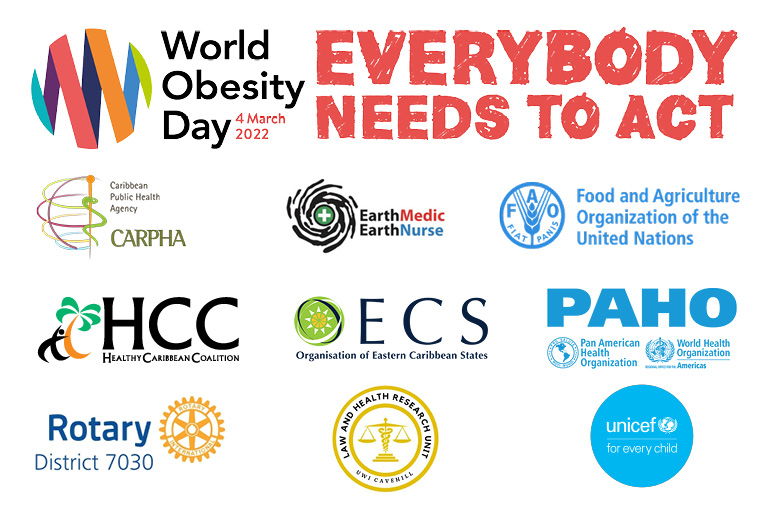Regional Partners unite to reaffirm commitments to tackle obesity as new global report shows Caribbean ranking high in obesity figures
Joint Media Release
Friday, March 4, 2022- On the occasion of World Obesity Day 2022 and in celebration of the theme ‘Everybody Needs to Act’, nine regional partners have united to reaffirm their collective commitment to work together to prioritise action against overweight and obesity even as the World Obesity Atlas, 2022 paints a dismal picture for obesity in the Caribbean.
The Healthy Caribbean Coalition (HCC) has joined with The Organisation of Eastern Caribbean States (OECS) Commission, The Food and Agriculture Organisation of the United Nations (FAO), The Caribbean Public Health Agency (CARPHA), The Pan American Health Organization (PAHO), The United Nations Children's Fund (UNICEF), Earth Medic/ Earth Nurse, The Law and Health Research Unit of the University of the West Indies, Cave Hill, and the Rotary District 7030, Rotary International, to highlight the need for robust policies to prevent and treat the crisis of overweight and obesity facing CARICOM countries.
The Atlas, released today March 4, 2022, by the World Obesity Federation, noted that:
- Six out of ten of the countries in the Americas with the highest estimated prevalence of obesity amongst women by 2030 are from the Caribbean with Bermuda topping this list at 48% and St. Vincent and the Grenadines at number ten with 42%.
- Six Caribbean countries fall into the top ten list when projecting 2030 child obesity rates (5-19 years), with Barbados and Jamaica at 22%, Bahamas at 23% and Bermuda at 24% exceeded only by the US at 25%.
- In terms of preparedness to tackle obesity and chronic non-communicable diseases (NCDs), the projections are equally bleak with six Caribbean countries (St. Vincent and the Grenadines, Suriname, Belize, Grenada, Guyana and Haiti) among the ten least prepared.
There is some good news. Among the top 10 most prepared to tackle obesity and overweight are Barbados, Trinidad and Tobago, and Jamaica. Additionally, St. Lucia and Antigua and Barbuda are projected to have some of the lowest levels of obesity in children and among adults in 2030.
Unhealthy diets dominated by unhealthy ultra-processed foods high in sugars, fats and sodium, are among the greatest contributors to overweight, obesity and NCDs. The costs of an unhealthy food environment are many: increased health costs due to diabetes, heart disease and stroke, as well as many cancers; stigma of people who are living with overweight and obesity; and reduced lifespans. Policies that transform food systems and create healthy food environments make it easier for Caribbean people to make the healthiest choices and are urgently needed. These policies will yield the greatest returns on investment. At present, Caribbean children and adults are at a disadvantage. They are born into, grow and live in profit-making, obesogenic environments where cheap unhealthy foods are widely available, accessible and heavily marketed. Caribbean citizens, especially children, have a right to nutritious food.
Healthy food policies which are based on sound evidence and have been shown to improve our food systems are well known and recommended by global and regional agencies including CARPHA, FAO, UNICEF and WHO/PAHO. These policies are set out in the CARPHA 6-point policy package to address childhood obesity through joint policy action and include but not limited to:
- Food-based dietary guidelines and nutrition education;
- Mandatory front of package nutrition warning labelling to empower consumers to make the healthiest choices;
- Fiscal policies to reduce the cost of healthy options while increasing the cost of unhealthy foods;
- National school feeding programmes and regulation in school settings to ban the sale and marketing of ultra-processed foods;
- Food supply policies that support domestic production of healthy foods while disincentivizing the importation of unhealthy foods;
- Double and triple duty actions which improve food systems while also addressing related challenges such as climate change; and,
- Conflict of interest policies to protect policy-making spaces from vested interests.
We must move swiftly and in concert, inspired by the vision of our past leaders who in crafting the seminal Port of Spain Declaration on NCDs recognised early that this group of diseases represented not only a health issue but a development issue warranting whole-of-government and whole-of-society approaches with each sector playing its respective part. Everybody must act. Civil society will continue to build public and policymakers awareness and support through strong evidence-based policy advocacy. Our regional academic institutions will continue to undertake research to complement global research and inform our regional policy agenda. Our regional agencies will continue to provide high-level technical support and guidance to Member States. Working together we will encourage our governments, under the leadership of our Heads of State and Government, to work across ministries in unison to implement strong coherent obesity policies.
‘Caribbean people, including our children, have a right to health-supporting environments and we can only achieve this by working together,” noted Sir Trevor Hassell, President of the HCC. “On World Obesity Day 2022, this diverse coalition of regional partners are united in our collective commitment to leverage our respective strengths in support of our governments, to tackle overweight and obesity and the interlinked challenge of NCDs through the implementation of effective treatment programmes and evidence-based healthy food policies which transform food systems for healthier Caribbean people,” Sir Trevor emphasized.
Dr. Carlene Radix
Avion Bamodu
Loverly Anthony
Sheena Warner Edwards
Marquita Sugrim
Carlon Kirton
Lisa Bayley
Lisa McLean Trotman
Dr. James Hospedales
Mrs. Nicole Foster
Dr. Virginia Asin Oostburg



